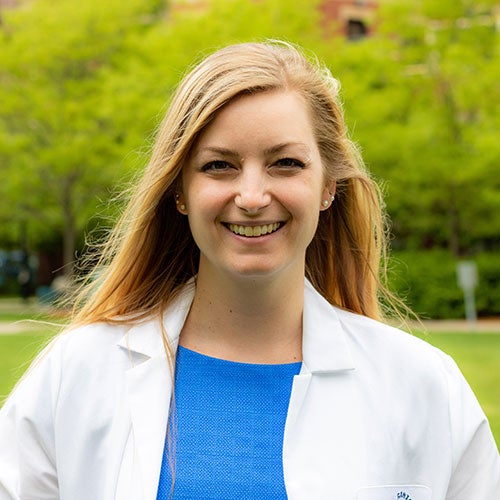Program Director Contact Information

Megan Feeney, PharmD, BCCCP
Clinical Pharmacy Manager - Critical Care and Surgery
Director - PGY2 Critical Care

Shyam Patel, PharmD, BCCCP
Clinical Specialist - Medical ICU
Coordinator - PGY2 Critical Care
We have officially early committed for our PGY2 Critical Care Program this year. Thank you!
For general residency questions, please email Megan.Feeney@bmc.org
Program Description
Boston Medical Center's PGY2 critical care pharmacy residency was the first in the Commonwealth of Massachusetts to gain ASHP accreditation in 2004. During that time, critical care pharmacy services have expanded to include dedicated specialists in medical, trauma, cardiac, neuro, and surgical critical care, and emergency medicine. Additionally, the resident staffs New England’s busiest emergency department, which has grown to be the only ED in the Commonwealth to provide 24/7 de-centralized pharmacy services. Our program offers a challenging, fast-paced rotation environment desired by candidates interested in pursuing a future in critical care and provides opportunities to complete a research or quality improvement project and medication use evaluation, serve on the Anti-thrombotic Task Force, lead continuing education seminars, pharmacy case conferences, and therapeutics seminars, and precept APPE pharmacy students from local colleges of pharmacy. Resident staffing responsiblities will involve coverage of the ED satellite pharmacy or provide decentralized coverage of the ICUs. Longitudinal projects may focus on research of quality improvement, based on the Institute for Health Care Improvement Model. The unique combination of our strong history, high quality specialist preceptors and learning experiences, quality improvement focus, and exemplary commitment to our diverse patients, makes BMC one of the best places for critical care pharmacy residency training in the Northeast.
Our PGY-2 critical care residents work closely with physician training programs in:
- Pulmonary, allergy, sleep and critical care medicine
- Emergency medicine
- Anesthesiology
- Acute care & trauma
- Cardiovascular medicine
Program Purpose
PGY2 pharmacy residency programs build on Doctor of Pharmacy (PharmD) education and PGY1 pharmacy residency programs to contribute to the development of clinical pharmacists in specialized areas of practice. PGY2 residencies provide residents with opportunities to function independently as practitioners by conceptualizing and integrating accumulated experience and knowledge and incorporating both into the provision of patient care or other advanced practice settings. Residents who successfully complete an accredited PGY2 pharmacy residency are prepared for advanced patient care, academic, or other specialized positions, along with board certification, if available.
Program Outcomes and Competency Areas
- Patient care (required)
- Advancing practice and improving care (required)
- Leadership and management (required)
- Teaching, education, and dissemination of knowledge (required)
- Academia (elective)
- Added leadership and practice management skills (elective)
- Mass casualty (elective)
Learning Experiences
Required Core Rotations (5 weeks unless otherwise specified)
- Orientation (2-4 weeks)
- Medical ICU (MICU) I & II
- Surgical ICU (SICU)
- Neurocritical Care (NCC)
- Cardiac ICU (CCU)
- Emergency Medicine
- Infectious Diseases Consult
Required Longitudinal Experiences (variable length)
- Pharmacy Practice & Leadership - 52 weeks
- Participation in emergency responses (code blue, code stroke)
- Decentralized staffing
- ICU evening shift staffing four weeks throughout the year
- ICU day shift during the final week of core ICU rotations (SICU, MICU I, NCC, CCU, MICU II)
- Every third weekend staffing of an ED or ICU shift
- One major and one minor holiday
- Decentralized staffing
- Longitudinal overnight ICU rotation - 12 total precepted overnight shifts
- Patent Care-Based and Didactive Learning Topic Appendix
- Participation in leader rounds
- Antithrombotic Task Force participation
- Executive Critical Care Committee participation
- ASHP Midyear Clinical Meeting attendance
- Assistance with coordinating interviews for prospective PGY2 critical care resident candidates
- Optional activities: assistance with maintenance of the residency program, participation in emergency medical services (EMS) ride-along, Marathon Monday participation, Emergency Neurological Life Support certification, Society of Critical Care Medicine Congress attendance, Chief Resident opportunity
- Participation in emergency responses (code blue, code stroke)
- Teaching & Pharmacy Education - 48 weeks
- 1 Case Conference or Pharmacy Morbidity & Mortality Conference (M&M)
- 1 Continuing Education lecture
- 3 ICU lectures (MICU or SICU)
- 1 clinical pearl presentation at the New England Critical Care Symposium OR 1 research snapshot presentation at Society of Critical Care Medicine Annual Congress
- Society of Critical Care Medicine Clinical Pharmacy & Pharmacology Section online journal club (20 minutes, if selected)
- 1, or more, journal club(s)
- Code Blue and ECMO simulation participation
- Medication Use System and Collaborative Learning Experiences - 48 weeks, 8 project days
- Quality improvement or research project with submission of a final manuscript
- Medication guideline development or revision
- Information systems support (e.g. CPOE, smart pump, ADC, Lexi-Comp) improvements
- Formulary management committee participation
- Completion of the Institute of Healthcare Improvement Basic Certificate in Quality and Safety
- Optional activities: monograph, policy development or revision
- Pharmacy Practice & Leadership - 52 weeks
Elective Rotations (2-5 weeks each, may chose 1-2 dependent on length)
- Cardiac/Surgical ICU off-site rotation experience at Massachusetts General Hospital
- Pediatric/Neonatal ICU
- Neurocritical Care (NCC) II
- Surgical ICU (SICU) II
- Cardiac ICU (CCU) II
- Emergency Medicine II
- Toxicology
- Medication Safety and Practice Management - Critical Care Focus
Benefits
- Estimated Salary: $64,000
- Vacation time: 12 days
- Office space with computer
- Travel/CE allowance (~$2,600/year): ASHP Midyear Meeting, SCCM, or other opportunities for additional national specialty meetings
- $750 cafeteria allowance per academic year
- $1000 move/licensure bonus
- Lease guarantee available to minimize security deposit requirements
- Insurance Benefits: health (100% employer-paid option), dental, vision, disability, accidental death and dismemberment, life insurance
 ht
ht 
 English
English Français
Français Deutsch
Deutsch Italiano
Italiano Español
Español Tiếng Việt
Tiếng Việt